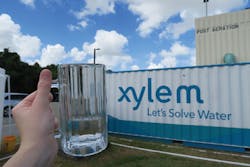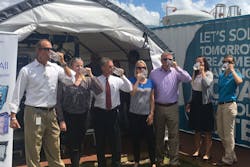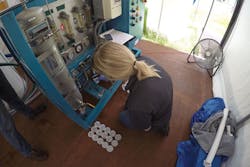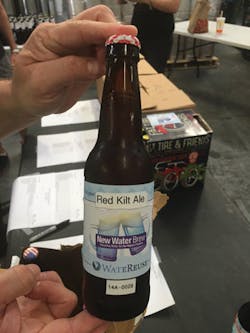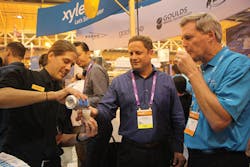By Steve London
In 2016, Hillsborough County Public Utilities, being a forward-thinking organization, initiated the first direct potable reuse pilot project in Florida. Hillsborough County Public Utilities, in its efforts to beneficially utilize 100 percent of its reclaimed water has initiated a successful program to effectively end surface water discharges that not only incorporates indirect potable reuse through aquifer recharge but also incorporates direct potable reuse in the future. In partnership with the WaterReuse Association, the county donated water generated from its direct potable reuse pilot to the association, which created the New Water Brew public education initiative. The WateReuse Association reached out to craft brewers to use the direct potable reuse water to make New Water Brew and hold a People’s Choice tasting contest at the 2016 Annual WateReuse Symposium.
Background
With more than 17,000 customers and agreements in place to serve another 5,000, for a total of 22,000 accounts, Hillsborough County has the largest retail reclaimed water program in the nation. In 2009, the county produced about 34 million gallons per day on average, with over 22 million gallons of which being distributed to customers, while the rest is discharged into surface waters. With an annual average use of typically 60 to 65 percent, due to Florida’s weather patterns, there are days and sometimes weeks every year when the utility is utilizing 100 percent of its reclaimed water resources in the dry months and significantly less during the rainy season. The utility’s long-term goal is to achieve 100 percent beneficial use of its reclaimed water, 24 hours a day, 7 days a week, 365 days a year.
In the early 1980s the utility converted its treatment operations to tertiary treatment. By 2009, the county’s Falkenburg Advanced Wastewater Treatment Plant, just east of the city of Tampa, underwent a major $31-million expansion that included a new headworks structure, including an odor control system; the replacement of eight existing aerators with new higher capacity units, including variable frequency drives; the construction of a 100-foot clarifier; conversion of the existing chlorine system to a new sodium hypochlorite system; upgrading the existing chlorine contact chamber to a state-of-the-art UV disinfection system; and the construction of two new nine-million-gallon reject water storage tanks, including a reject pump station. Three emergency generators and automatic transfer switches were also added and upgrades to the existing reclaimed water and plant service water pump station were completed, as well as upgrades to the plant’s supervisory control and data acquisition and security camera, associated site work, and electrical and instrumentation controls.
Pilot Plant Study
In July 2016, GE’s ultrafiltration and reverse osmosis units and Xylem’s WEDECO MiPro® portable trailer-based pilot plant were used for UV/peroxide advanced oxidation process (AOP) to produce potable reclaimed water at the Falkenburg plant. Tetra Tech, a provider of consulting, engineering, and technical services, collaborated with the WateReuse Association, Xylem, and GE to design, build, and operate the direct potable reuse pilot purification process to treat reclaimed effluent wastewater to comply with Environmental Protection Agency (EPA) drinking water standards. At the Falkenburg facility, Tetra Tech’s design for the pilot system put water through an intense purification process.
Tetra Tech led the onsite installation and operation of the full advanced treatment process, which consisted of ultrafiltration, reverse osmosis, and advanced oxidation with UV light and hydrogen peroxide. These processes, which were operated in batch mode over the course of a week, produced about 1,000 gallons of purified water. The purified water was tested for primary and secondary drinking water standards, as well as non-regulated microconstituents, pharmaceuticals, and personal care products.
Results from the water quality monitoring revealed that the purified water produced from the pilot purification process met all principal standard maximum contaminant levels (MCLs) set at the federal and state levels. Additionally, the purified water met all numerical secondary drinking water standards and MCLs. The federal drinking water MCLs are set up by the EPA and adopted by the Florida Department of Environmental Protection.
Direct Potable Reuse Validated
The pilot project validated direct potable reuse, which is also being evaluated on the west coast and is now a key initiative for many central Florida utilities due to the implementation of the Central Florida Water Initiative (CFWI) requiring the additional utilization of reuse water resources. The CFWI is a collaborative water supply planning effort among the state’s three largest water management districts; the Florida Department of Environmental Protection; the Florida Department of Agriculture and Consumer Services; and water utilities, environmental groups, business organizations, agricultural communities, and other stakeholders.
The Falkenburg Advanced Wastewater Treatment Plant is responsible for the treatment of a portion of the county’s wastewater service area, and is permitted for a capacity of 12 million gallons per day. The facility utilizes advanced wastewater treatment processes to provide biological nutrient removal, followed by tertiary filtration and UV disinfection to produce high-quality, public-access reclaimed water. The reclaimed water is then pumped into storage tanks for distribution to reuse customers. Any excess water not used by the reuse customers has historically been discharged to surface water. However, with the creation of an aquifer recharge program, unused quantities of reuse water from Falkenburg are currently being stored underground to create a saltwater intrusion barrier.
The Water Reclamation Facility is staffed 24 hours per day, seven days per week by personnel certified in wastewater treatment. Operational staff is responsible for collecting and analyzing routine samples throughout the system to ensure compliance with permit conditions as well as preparing and submitting all necessary reports to the appropriate regulatory agencies.
The WateReuse Association is the leader on alternative water supply development. The organization provides policy guidance and educational tools on water reuse and is also a major influencer of public opinion, lawmakers, and policymakers on policy and projects related to water reuse. In 2016, the WaterReuse Association had an idea: start the conversation about potable reuse with beer!
Good to the Last Drop
The association worked with Special Hoperations, a beer brewing organization located in Tampa, to provide potable reclaimed water for the purpose of craft beer brewing in the New Water Brew Competition. The potable, reused water - treated to the highest standards - was provided to around 100 registered home brewers, each of which received two five-gallon buckets of purified water for brewing. The beers were sampled at the 2016 Annual WaterReuse Symposium in Tampa where judges awarded cash prizes and medals for first, second, and third places in four subcategories of beer.
WaterReuse also showcased beer samples at the WEFTEC 2016 conference in New Orleans and will be taking the show on the road in 2017 with panel discussions, workshops, and beer tastings at water events throughout the U.S. All in all, the beers brewed with potable reclaimed water received high praise and kudos from the judges, participants, and consumers, perhaps bringing new meaning to the phrase “Bottoms up!”
About the Author: Steve London is president of Steven London Associates (Apollo Beach, Fla.). He has extensive background as a writer and editor specific to municipal water treatment technologies. For the past 19 years, his company has developed application articles that highlight various solutions for water management professionals. London can be contacted at [email protected] or (813) 645-0209.
